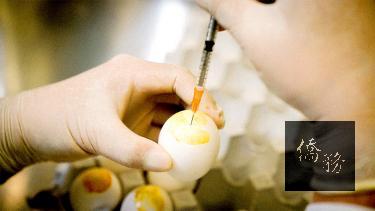
Academia Sinica researchers have developed a “more potent” vaccine against cross-strain influenza viruses using chicken eggs, the institution said yesterday, adding that the technology has been sold to a transnational pharmaceutical firm.
Due to the variability of the flu virus, which alters its surface proteins, vaccines are only effective against closely matched virus strains and must be regularly updated, which is a headache for vaccine developers, the team said in a news release.
Led by Wong Chi-huey, a distinguished research fellow, and Alex Ma, an associate research fellow at Academia Sinica’s Genomics Research Center, the team used the eggs to produce monoglycosylated inactivated split H1N1 virus vaccine, which induced better immune responses on mice.
The new vaccine is expected to be three of four times more effective than traditional flu vaccines, the researchers said.
Their findings were detailed in a paper titled “Egg-based influenza split virus vaccine with monoglycosylation induces cross-strain protection against influenza virus infections,” which was published this month in Proceedings of the National Academy of Sciences of the United States.
To expose more antigenic sites shielded by glycans, the team developed a strategy to remove the glycans from the virus’ surface, the paper said, adding that after immunization with the monoglycosylated split virus vaccine, mice had broader immune responses against cross-strain H1N1 influenza infections.
Flu causes hundreds of thousands of deaths worldwide each year, the team said, adding that it hoped the so-called “flu season” could someday become history.
The researchers obtained several patents on the technology worldwide and sold it to a multinational pharmaceutical firm in accordance with Academia Sinica’s intellectual property and technology transfer procedure, the institution said.
The flu vaccine studies go back a decade, and the technology was transferred to OPKO Health Inc’s Taiwan branch years ago, Ma said, adding that the firm is responsible for clinical testing of the medication.